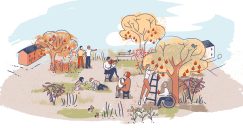On the 26th of June LEVERS participated to an in-depth discussion about Innovating European Education promoted by sister projects Make it Open and SALL, with the support of the OStogether network at the European Commission in Brussels.
The OStogether network is an informal network of initiatives funded under calls related to Open Schooling through the Horizon 2020 and Horizon Europe programmes.
The network brings together more than 50 organisations closely collaborating together and complementing each other within the big picture of Open Schooling.
During the current European Year of Skills, the event brought together policy makers as well as experts in innovative science education practices. This forum was a fantastic opportunity to share the vast body of knowledge and experiences that have been built over the years on Open Schooling (including various references) indicating how this could shape policies around innovating European school education systems and the future.






